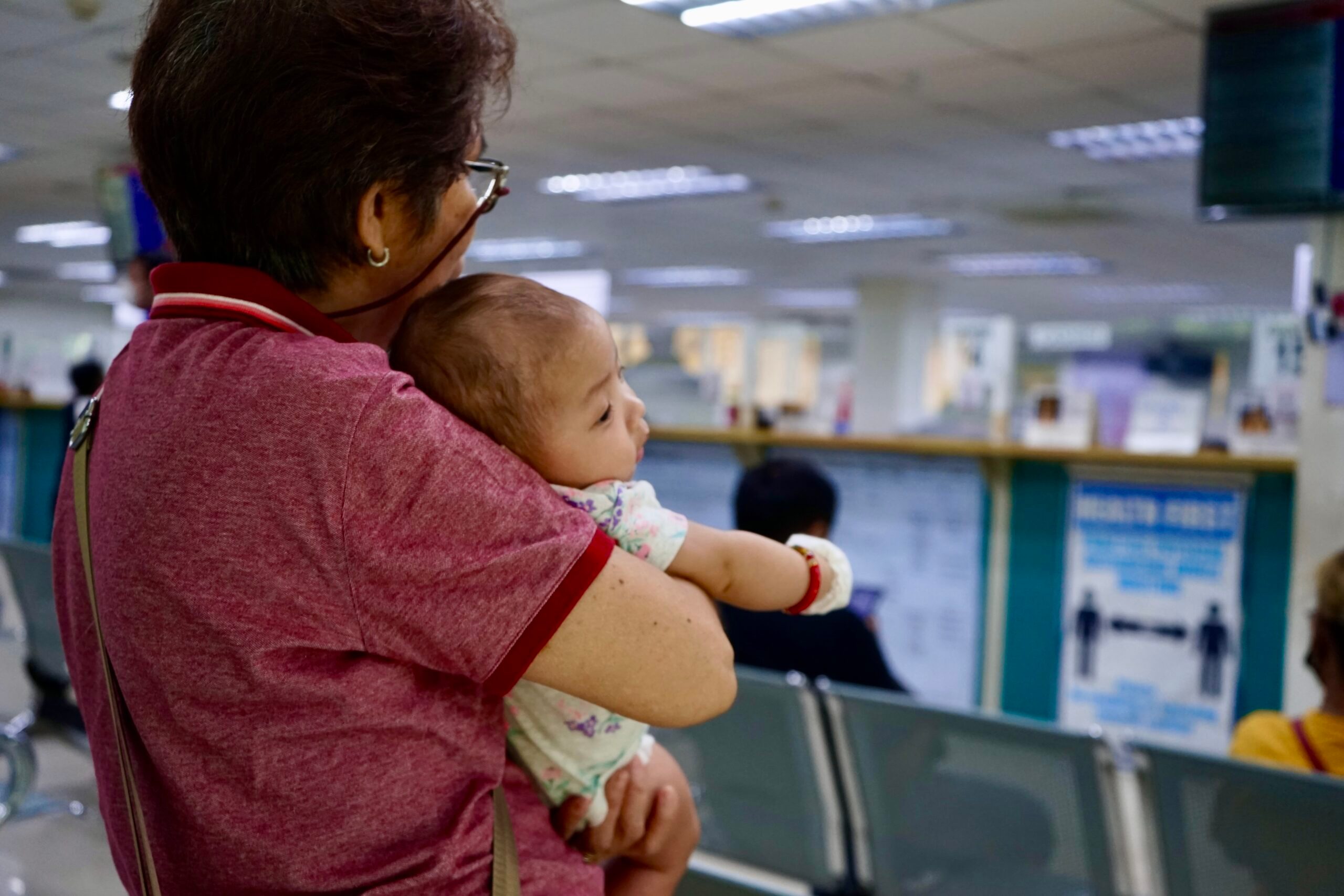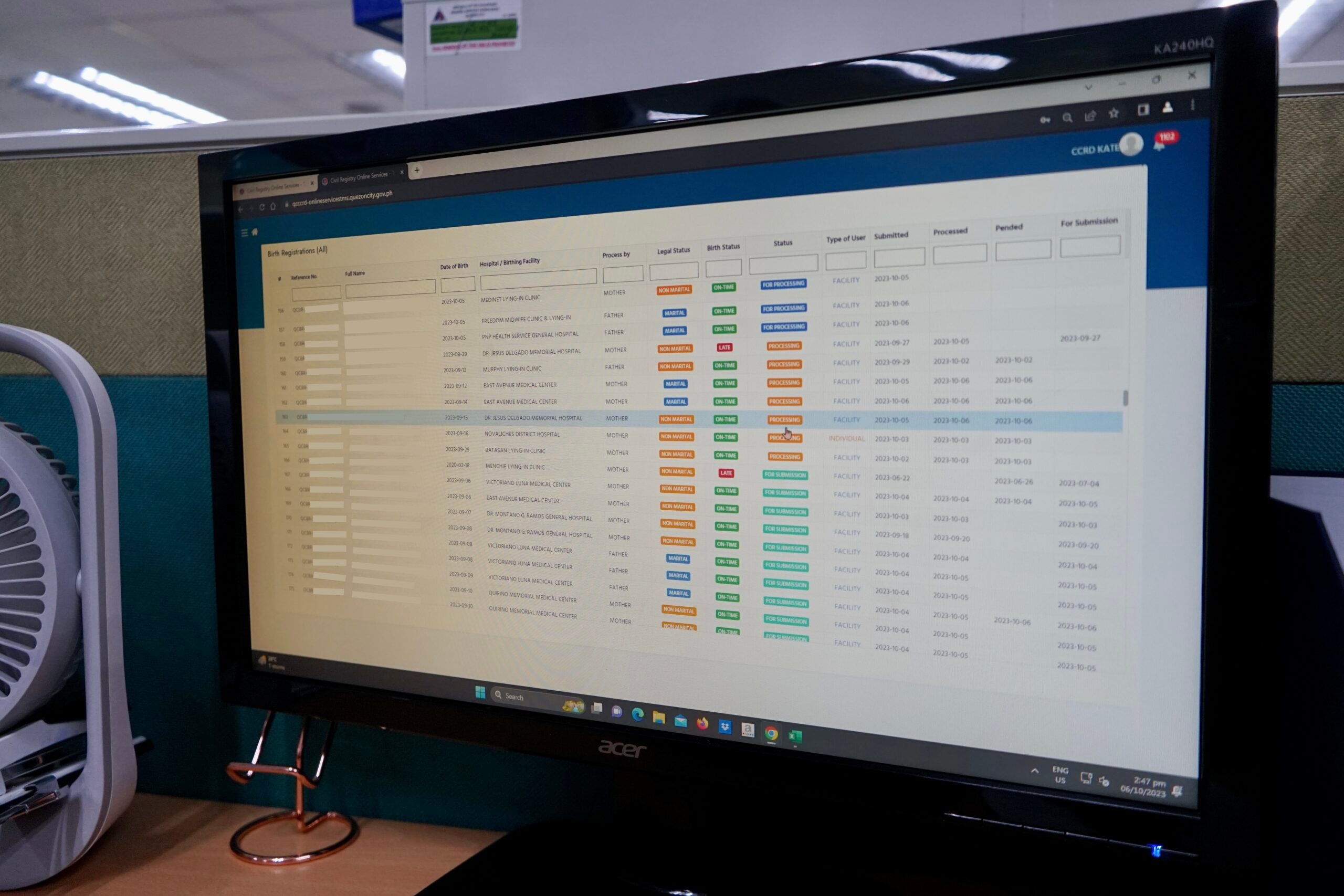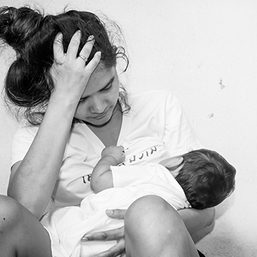SUMMARY
This is AI generated summarization, which may have errors. For context, always refer to the full article.

MANILA, Philippines – In Quezon City, all births since July this year have been successfully registered, thanks to the city’s new automated birth registration system.
On the surface, it may sound like an easy feat. But the Philippines, with a population of around 110 million, is still unable to register all births in the country. In 2019, the Philippine Statistics Authority reported that 5 million Filipino births were not registered – 40% of whom were infants and children up to 14 years old.
“The birth certificate is the legal proof of identity. Without it, you do not legally exist,” said Paolo Brillantes, chief administrative officer of the Quezon City Civil Registry, in an interview with Rappler on Friday, October 6.
Filipinos without birth certificates may face difficulty accessing social services, healthcare, and education. They may also find it difficult to apply for jobs and travel documents.
But Quezon City – the country’s most populous city – found a way to solve this problem by creating an online system that every birthing facility in the city could use.
They call it the Quezon City Birth Registration Online (QC BRO), an online portal that began operations in May 2022. The portal, which the city claims is the first of its kind in the country, is one of two Quezon City projects that were recognized as finalists in the 2023 Galing Pook Awards.
The Galing Pook Awards recognize innovative practices by local government units (LGUs).
Errors in traditional forms
In the birth registration process, there is preparation and registration proper. Prior to the start of this portal, registration was “no problem” with the civil registry; it was the preparation of the certificates at the birthing facilities, said Brillantes.
Traditionally, birthing facilities manually fill up a dummy birth certificate form that mothers would check after giving birth. According to Brillantes, this old process of typing up all the information is “prone to error,” especially for an exhausted mother who has just pushed out a baby.
When the certificates reach the civil registry, LGU employees might find discrepancies, especially in names, once they compare them with other documents needed for registration like the parents’ marriage certificate.
In cases like this, the Quezon City Civil Registry had to send the birth forms back to the facilities for the parents’ corrections. Parents and liaisons are sometimes unable to process the corrections before the 30-day period they have to register the births of their children, in line with the Civil Registry Law, lapses.
Birth registrations done more than 30 days after a child was born are considered “delayed.”
In 2019, Quezon City had 10,135 delayed births. This number dropped by more than half when the COVID-19 pandemic hit, at 4,400 in 2020.
These unregistered births are identified by Operation Birthright, where LGU officials go to barangays and seek out people who have not registered their births.
“Come pandemic, Mayor Joy [Belmonte] wanted us to have a database,” said Brillantes. The city’s civil registry could only provide birth information based on registered births, which was an incomplete picture of all the children who were actually born in the city.
This is what led the LGU to automate the system through QC BRO. Work began in November 2021 together with third-party developer Estaniel Enterprises, and by May the following year, the platform was fully up and running.
Accessibility
QC BRO can be found through the e-services portal of the Quezon City website. Each and every birthing facility, which include hospitals, lying-ins, and maternity clinics, public and private, can access the portal as long as they have an internet connection and a computer.
Users have their own accounts where they can register all births in their families that occurred in Quezon City. Many of the items to be filled on the forms may be selected using drop-down menus, instead of typing them manually.

This way, when facilities ask the parents to verify the accuracy of the dummy forms at the hospital, they can focus on the details that are most prone to errors, such as their names.
On the platform, parents can electronically attach other requirements needed for registration, such as the marriage certificate of the parents, or an affidavit of the father’s acknowledgement for children born to people who are not married.

The LGU verifies the correctness of the birth certificate with these attached documents. Once verified, the LGU informs the parents that they may proceed to send the original documents to the Civil Registry. They may come in person, or send these in via courier.
Not just for newborns
The platform not only benefits newborns – but adults as well.
With an online platform like QC BRO, even adults who do not have birth documents have a chance at finally registering. All they have to do is go on the platform, fill up the form, and send in the documents – the same as how a 31-day-old baby’s parents would do it.
Having a database of births may also be crucial in helping the Philippine government track teenage pregnancies.
Editor’s Note: An earlier version of this story said there were at least 652 children born to teens aged 17 and below. This has been corrected.
The Quezon City government has recorded at least 26,652 births in QC BRO as of posting. Rappler requested data on babies born to minor mothers, which the Civil Registry was able to provide within a day. There were at least 651 children born to teens aged 17 and below.
The youngest mothers in the system were 12 years old when their babies were born. There are two of them. There were also 144 girls who gave birth at age 13 to 15.

With data on age differences of parents tied to birth registrations, Quezon City and all other LGUs who follow suit with encoded birth data can track when a birth possibly came from an exploitative situation.
The minimum age of sexual consent in the Philippines is 16. Any adult engaging in sexual activity with a child younger than 16 is considered guilty of rape.
Perfect registration
From July to October, there have been no unregistered births in the city, Brillantes claimed.
“[In a conversation] with my boss, we joked that if everyone in the Philippines was born in Quezon City, everywhere in the Philippines, we can register them,” said Brillantes.

In the civil registry building, 65-year-old Ester Labagril carries her three-month old granddaughter, Janella, while the baby’s parents fill up forms for her birth registration.
Janella’s mother is a barangay secretary, while her father works as a clerk in Binondo. They could not register Janella’s birth in time because both parents were busy with work, Labagril said.
Labagril told Rappler that registering, even if late, was easy.
On QC BRO’s selection as a finalist in Galing Pook, Brillantes said: “We are very happy that we were selected as a finalist, because it is a testament that the projects of the Mayor Joy and the Quezon City develops are really geared towards good governance and towards helping people.”
“We also want to be an example to other local government units, that this kind of problem can be easily solved if we just focus or streamline our resources [and] manpower into these kinds of projects,” he added. – Rappler.com
Add a comment
How does this make you feel?



There are no comments yet. Add your comment to start the conversation.